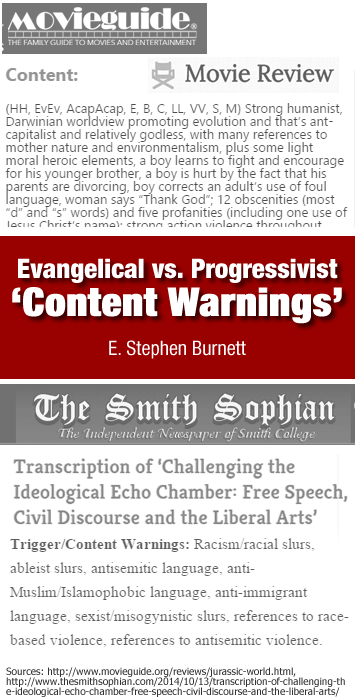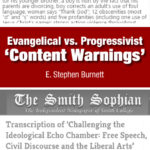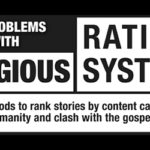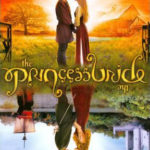Evangelical Vs. Progressivist Content Warnings 102
 Evangelicals like to have “content warnings” against things such as certain words, sexual dialogue, or violent moments. They believe these things will harm or tempt weaker people.
Evangelicals like to have “content warnings” against things such as certain words, sexual dialogue, or violent moments. They believe these things will harm or tempt weaker people.
Progressivists1 like to have “content warning” against things such as certain words, sexual dialogue, violent moments, or in more recent cases also certain symbols in popular culture. They believe these will also harm or tempt weaker people.2
As I pointed out in my first article in this miniseries, I see little difference between the two approaches to content warnings—although members of both sides often accuse the other of exclusively practicing censorship and moralism.
But as I’m about to say in this article, Christians have good reasons to reevaluate a default posture of plastering warnings on all or most offensive content. Do we think that by giving all the warnings, we are the mature ones who protect “the weaker” who may or may not be actually weak? Do we act like even mild censorship is the best way of guarding against sin?
Content warnings do serve some good
Let’s recall first that either set of content warnings—either those used by evangelicals or by progressives—may be well-intentioned and may help people. I would never suggest that small children should be able to handle exposure to sexual dialogue. I also never suggest victims of real violence, with real “triggers,” should be thrust before, say, a violent scene.
That’s my problem with some of the pushback I’ve seen against all content warnings.
If a Christian movie reviewer says a movie includes 14 and a half F-words and therefore is unsuitable for children, is it cool to mock the reviewer?
If an article about date rape is prefaced with a warning that rape victims might find challenging and hurtful content in the article, should we imply that this is unnecessary?
Let’s not suggest that in every case, if someone is “triggered” or offended, well, that’s their problem and they should grow up or toughen up. That’s a kind of Darwinianism. It’s not how the Bible recommends we respond to those who are suffering the consequences of others people’s evil, or struggling against their own temptations to sin.
But let’s challenge our motivations
That being said, I think I’ve discerned a pattern of behavior and statements that give away one problem. The problem is that some people are putting content warnings on pretty much anything potentially controversial, not out of legitimate care but because they kinda want to fancy themselves the “smartest” or “most discerning” or “most caring” guardians.
I’m not saying this practice is motivated by self-righteousness. But it certainly can be.

By all accounts, the 2005 movie version should be banned for other reasons.
Recently I engaged in a discussion with an internet friend about a similar issue. He thought more highly of the intentions of most people behind “content warnings” and even bans, such as pulling the old TV show “Dukes of Hazzard” because the car shows a Confederate flag. But based on biblical suspicion of human nature, I must view such attempts more negatively—as at best a mixture of good intentions but also savior-complex impulses.
For evangelical content-warners, maybe we also like to fancy ourselves the mature grown-ups. We are the special saviors who can see a violent movie or listen to a fornication-praising song “on behalf” of the simple, naïve, or weak people, especially children.
Then of course, as a Ministry we can inform people what’s wrong with the story or song, assuming all or most other Christians are immature and can’t handle stuff like we can.
A subtle form of this approach is behind the practice of doing this to a bad word: “d***,” and then acting like I am the big tough ranger Christian who is protecting helpless hobbits. “I heard a bad word and I can stand it, but I Censored it so you need not see it and be hurt!”
Undoubtedly too, in the progressivist/secularist world, columnists and pundits and writers are doing the same thing. In one recent example a student newspaper flagged even the word “crazy” (though they did not add the badness-obscuring asterisks or hyphens) so that weaker people would know that a bad word was there and could avoid it if necessary.
And let’s ask: Where does the constant content-warning end?
I also see few ultimate first-principles behind many content-warning advocates. They seem to minimize not only free-speech rights but the rights of artists to explain their intentions. Instead content-warners cite anecdotal statistics (“that idea will hurt the most people”) and often subjectively excuse certain people (“well, this trusted artist didn’t mean that”).
Without higher first principles, there is logically no end to content-warning gone amok.
If you warn about a Content that does not actually hurt people, few are reluctant to point this out. The only limitations stopping you are how many others you can get to listen to you, and whether you’re at the right moment to hit or start a cultural condemnation trend.
 Let’s say a pundit has a large audience of people who trust him, and he decides “Gilligan’s Island” ought to be banned or content-warned. He suggests the show is both racist (which it probably is in places) and filled with sexual innuendoes (which it also is in places). And let’s say other people, who are informed, respond with irritation at the would-be censor.
Let’s say a pundit has a large audience of people who trust him, and he decides “Gilligan’s Island” ought to be banned or content-warned. He suggests the show is both racist (which it probably is in places) and filled with sexual innuendoes (which it also is in places). And let’s say other people, who are informed, respond with irritation at the would-be censor.
But what about uninformed people who hear the controversy only casually? The choice is:
- Support banning or content-warning an old TV show and thus enable censorship.
- Support efforts to criticize the content-warners and end up enabling a worse sin.
Honestly, given a choice between those sins, I would also choose the lesser of two evils.
But the choice is a false one. It does not actually fight actual sin or help people mature.
Let’s explore this next time.
- I am referring here to an informal secular religion, not a political cause. ↩
- Samples of both warnings are in the image. The top example is from a MovieGuide review. The bottom is from a college newspaper. ↩









































The “or tempt” part is puzzling me, because IME, Progressivists don’t use that kind of language. What’s generally more important is if you do, or do not, say an -ism. If someone wants to say an -ism but is socially aware enough to realize that is not acceptable in a context, then they are generally viewed as being fit for polite society. Unless they do it anyway, and then they’re probably a troll.
But anyway, it’s almost like a challenge to see how many codewords you recognize or can guess. I mean, AcapAcap? Waaat?
Also, if anyone is puzzled, I can provide an explanation as to why “crazy” is Frowned Upon.
Also, too, Progressivists would generally see the descriptor “weaker” as being ableist. “Vulnerable” is the generally preferred term.
The “tempt” is unique to evangelicals. E.g., “If my child hears a swear word, it will tempt him or her to start using that kind of language and with bad intent.”
The term “weaker,” also, is an allusion to the Christian concept of “weaker brother.” The weakness is not in any physical, emotional, or mental way, but in a spiritual way. E.g., “I am vulnerable to this temptation, so I’m unable to see this without being tempted and I would prefer not to face that struggle again.”
I would be interested as to how “crazy” is seen as a slur that should be restricted. In my mind, “crazy” is a perfectly fine word to describe beliefs or thinking that are irrational. There is not any intrinsic connotation of mental illness-stigmatizing.
Then I’m puzzled why you’re applying evangelical terms to Progressivist ideas when it doesn’t actually apply.
Also, “intrinsic connotation” seems like an oxymoron. Connotations are pretty much purely cultural, so what would constitute an intrinsic one?
In some ways, “crazy” has lost its sting by sheer varied usage, but it’s a long ways from extinction. I know a lot of people use it ironically, and for inanimate objects it’s almost a neutral descriptor, but when applied to the animate and/or sentient, it’s pretty much always backhanded. Some people just want to hurry its extinction by nuking it from orbit.
I’m not sure why you claim the term “tempt” does not actually apply. The term is unique to evangelicals. But the meaning is shared by humans of all religions. We all believe in some kind of temptation, and most of us suspect that inanimate objects cause (or are involved in some way with) temptation.
For instance, if we presume the better of the ban on classic TV shows that include controversial items or images (that is, we presume it’s a principled decision and not mere pandering), what other reason is there to pull that “Dukes of Hazzard” show other than “seeing the flag might tempt someone to become more racist? This is belief I constantly hear from progressivist devotees.
I appreciate your point that the term and idea of “intrinsic connotation” is self-contradictory. But this is just the line of reasoning I’m opposing: the notion that “this thing only ever connotes one thing,” without room for anyone who sees things differently or comes on the scene completely unaware of the stigma.
A verbal violence that I insist is not only censorious but unnecessary.
Really? I’ve never heard Progressivist types claim that, for example, the Confederate flag makes people racist. They claim the flag in of itself is racist (or half a dozen the other, is a racist symbol) and that’s why it needs to be BYE FELICIA’d ASAP.
It’s not about not tempting trolls to come in your house and soil the carpet, but dealing with the ones that do come in, because trolls gonna troll. It’s what trolls do, ergo there is no meaningful niche for “tempt” to occupy. The careful wording is about being polite to your audience, not troll management.
Right. But in that case I am applying some generalized philosophy here. Progressivists have (either consciously or otherwise) purged remnant Christian understandings of belief in original sin–that is, the notion that evil corruption comes from inside a human being and proceeds outward.
This is what Jesus Christ believed and taught, as He clearly said in Mark 7.
Without this belief, one is left with blaming the world “outside” for those corruptions. The fault is not human nature. The fault is The System, or symbols, or abstract ideas, or flags. In short, yes, “the devil” made you do it, because “the devil” is what is sinful, not you, and yes, an inanimate object can be blamed scapegoat-like for a sin of racism. It’s ultimately a parody of the Judeo-Christian idea of casting one’s sins (and thereby their penalty) upon another thing or another person. The term “scapegoat” comes from the Old Testament–literally a goat on which the people would symbolically “place” their sins (with a priest’s aid). Christians belief Jesus fulfills this type.
I realize a progressivist would not directly claim “the flag makes you racist.” But ultimately, without belief in original sin that lies in the heart of all humans, yes, they must blame The System or objects for sin’s corruption. Either that, or they lapse into the old Pharisaical notion of holding some humans as intrinsically more corrupt with “original sin” than others. But this is indeed beginning to happen, with evangelical Christians a new scapegoat.
What, like trigger and content warnings? I see that all the time on Amazon. Particularly on romance with erotic content. “Warning: Contains adult language and sexual situations. High heat level.” Authors have taken to putting these in their book summaries to ward off the 1-star reviews, and I’ve been grateful that they have. Just like with movie ratings, I can tell at a glance if it’s something I’d like to read, or not.
(That and the reviews that nail these books to the wall for terrible writing and editing.)
I recently read a book that had some really gruesome reviews, because the readers didn’t realize it was a Christian book with huge swaths of preaching in it. Goodness, these people were MAD. I felt bad for them. I hate being preached to about worldviews I disagree with, too.
Sounds like it’s a surefire (ha ha) way both to avoid low reviews and to add titillation.
That response has always struck me as irrational, and an excellent demonstration of the progressivist reliance on its own growing subculture bubble that has been pre-cleaned of “objectionable” ideas for their convenience. But I suppose it is fun to get worked up about “immoral” things, and those have to be found somewhere.
So Kessie, I am curious. Would you or would you not agree with a very evangelical-sounding disclaimer as articulated in Walter Cantrell‘s below comment?
I’m hoping to Self-Publish a couple of books toward the end of the year, and I started thinking about whether or not I should include some kind of warning at the end of the blurb. Here’s what I’ve come up with so far.
WARNING: This Book Contains Strong Christian Content. Throughout this Adventure, the Gospel of Jesus Christ is Presented in a Straightforward and Unapologetic Fashion.
Romans 1:16 For I am not ashamed of the gospel of Christ, for it is the power of God unto salvation for everyone who believes…
Sometimes I appreciate content warnings, but other times I think people take them too far. When taken too far I find such content warnings annoyingly misleading. People might, for instance, warn the audience that there is sexual content when there is actually only a very small implication that a couple slept together ‘off screen’. Depending on the circumstances, this may mean that I have to miss a part of a story because I got the impression that it contained a sex scene when it really didn’t. Maybe part of the issue is that some rating systems have very general terms that don’t really give the audience an idea of what the story is actually being rated for.
When I was little I thought about how movie ratings were helpful sometimes, but not always because they don’t rate for things that my parents may have banned. My parents tended to have rules against shows with tons of magic, for instance. I guess that’s one reason why I feel that parents should try to watch shows with their kids or before their kids.
When it comes to other things, such as trying to eliminate the confederate flag off the face of the earth, I get pretty irritated. Keeping it out of tv shows takes out a lot of history and limits characters’ beliefs. More importantly, I dislike how people do everything they can to get such things changed or removed rather than addressing the real roots of society’s problems. I remember my intro to psychology textbook talked about how it was wonderful that some tv show had avoided using the name of Mark Twain’s character of Injun Joe. But the textbook went on to say that unfortunately the show used the name Crazy Joe instead, which was supposedly discriminate toward the mentally ill. Racism and all that is of course evil, but there’s a difference between advocating racism and simply telling a story set a few hundred years ago and showing people in the mindset they had back then. Plus, if even calling a character crazy is bad, then what should we do instead? Call the character Kind, Sweet Joe even though he is a villain? I’d rather people write about mental illness in a way that educates people about it and shows them ways they can help the mentally ill, but we don’t have to eliminate any mention of the word crazy just to do that.
Sounds like we’re in agreement, Autumn.
I have actually noticed this about some Christian reviews. Mileage may vary, but in the example of, say, a movie’s representation of someone in short shorts–say, Pepper Potts in The Avengers–it would actually be more titillating to read a content-warning description of the Potentially Objectionable Scene than to actually see the scene. As it is, the scene itself is so brief, casual, and only mildly sexually charged that it flies by me–such that I had to think for a bit to recall the example.
“It does not actually fight sin nor help people mature.”
Bingo. That is the problem in a nutshell. I don’t have a problem with content warnings in general, like movie ratings that tell you whether or not the movie is G, PG, or whatever. And I don’t have a problem with sites that try to review media so that parents have an idea what is in a particular movie or book or whatever, which helps them sort through all the options available.
The rest? Ugh. I mean, look at it this way. If someone has been violently assaulted and is having a hard time dealing with that, don’t you think they self-censor? For example, my mum died of Alzheimer’s Disease. That’s why I haven’t seen/read The Notebook or read the book Still Alice. Just by reading the dust jacket I can see that the book is about someone who dies of Alzheimer’s. So I choose not to read it because it will stir up memories for me and make me sad.
Knowing that media is full of violence, swear words, and portrayals of every evil known to man, if a person is particularly sensitive about a certain subject, don’t you think they research media choices to make sure that the subject isn’t portrayed so that they can avoid it? I personally hate watching movies that are full of swearing. Once a movie starts and the potty-mouth begins, I will eventually turn it off if it doesn’t get better.
These content warnings make me feel like people are a bunch of passive, quivering people hiding under their blankets who need everything spoon-fed to them by Big Brother. Give us some credit for taking care of ourselves, I say.
Exactly. They may rely on content warnings — especially those from reviewers or trusted friends — but they are more mature if they realize the problem (if we may call it that) is with their own pain and struggles, and/or temptations.
This is why we need good reviews of media, which does mention the objectionable content — but more as a footnote on the way to reviewing the actual story in context. This is why I’m divided, but would vote mostly against, the notion of counting up bad words for a final tally — there really is no point of doing that. If one struggles with hearing one bad word, one is all you need to disqualify, isn’t it?
Yes, exactly. That’s how I feel too. A good review will tell you what you need to know without having to count and detail every sin that it includes.